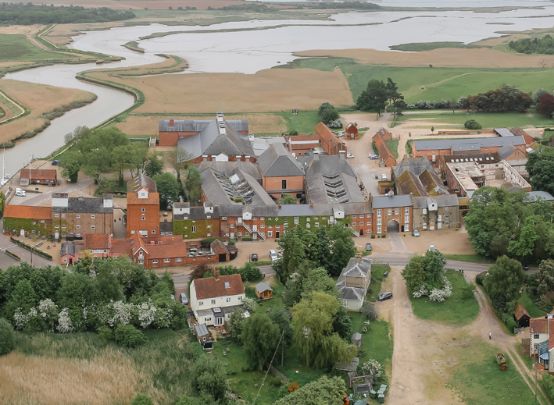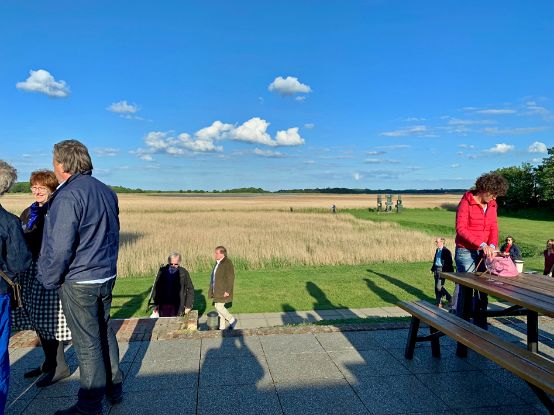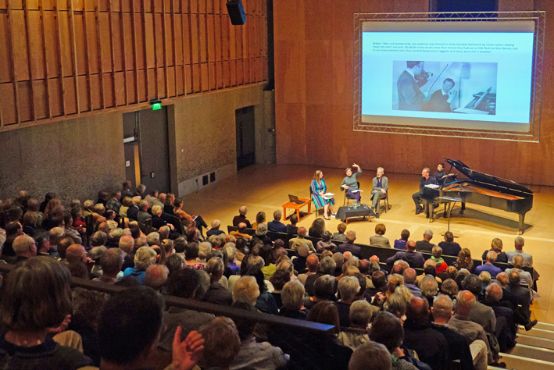The spirit of Benjamin Britten hovers over everything
The traditional Aldeburgh Festival is now part of a comprehensive cultural project on the English east coast.

Aldeburgh is a good example of how culture can become an economic driver in a rural area. It was once a sleepy fishing village two hours' drive north-east of London. Then, after the Second World War, the composer Benjamin Britten and the tenor Peter Pears settled here and founded a music festival in 1948. This was the beginning of a unique development. Today, Aldeburgh is a cultural destination with international appeal. To the two and a half week festival in June visitors come not only from all over the kingdom, but now also from the continent.
The spirit of Britten, who died and was buried here in 1976, seems to hover over the place. His operas, which deal with the fate of outsiders, repressive morals and harsh nature, were written here, and his name can be found on memorial plaques and street signs. The country house where the two lived is now a museum and home to the extensive Britten archive and the financially strong Britten-Pears Foundation.
Art from the malt factory
The foundation lives from the worldwide copyright income and is mainly dedicated to maintaining the Britten legacy, but also supports various cultural initiatives. In particular, it is heavily involved in the activities of the Snape Maltingsa cultural center on the outskirts of the village of Snape, a few miles from Aldeburgh. This is also where most of the festival events take place. The Maltings: This is the extensive site of a former malt factory, set alone in the open countryside, between meadows and an extensive reed bed. Nature and culture form a unique harmony.
Back in 1967, Britten had a factory building converted into an acoustically outstanding concert hall; even the Queen attended the opening. Today, the Maltings form a cultural cluster with concert series throughout the year, courses for amateurs and professionals, rehearsal rooms, artists' studios, galleries and an infrastructure with restaurants and stores. The whole thing is managed by Roger Wright, former BBC man and chief planner of the London Proms. He plans to significantly expand the international connections in the coming years.
-

Konzertpause in der Abendsonne. Foto: Max Nyffeler
Strange light
Britten is not only invisibly present in the institutions, but also concretely musically in the festival's wide-ranging program. This year, the excellent young Castalian Quartet played the second string quartet from 1945, a tribute to Henry Purcell with symphonic dimensions. Britten operates here with historical formal ideas and concludes provocatively with the C major chord - tonality suddenly appears in a new, strange light.
The German avant-garde in particular has always turned up its nose at Britten because of such ideas. On the island, on the other hand, he is regarded as a figure of the century by a wide audience - understandable in view of a work such as this quartet, which appeals directly through its emotional power and musical intelligence. Perhaps it is time to take a closer look at this composer's instrumental oeuvre in this country too.
This thought comes to mind all the more in the case of the Holy Sonnets of John Donne. Britten wrote the song cycle after the memorable concert that he performed together with Yehudi Menuhin right after the end of the war. in front of the liberated prisoners in the German concentration camp Bergen-Belsen. The horror and outrage at what he had seen echo in the songs and combine with the inner turmoil of the poems to create a stirring personal confession. This is great art of timeless topicality. The tenor Mark Padmore, supported on the piano by Andrew West, struck the perfect note, and before the concert he engaged in a knowledgeable conversation on stage with the writer Lavinia Greenlaw and the musicologist Kate Kennedy about the songs and their authors.
-

Mark Padmore im Gespräch über Brittens «Holy Sonetts of John Donne». Foto: Aldeburgh Festival
Wide aesthetic horizon
Loosely moderated concerts by the artists are a trademark of the festival, which successfully strives to break down cultural barriers. The aesthetic horizon is broad, and there is also room for the unwieldy, from Boulez to Birtwistle. Or, as in Pierre-Laurent Aimard's piano recital, little-known works by Luigi Dallapiccola and the pianistically impressive Shadowlines by George Benjamin. The English vocal ensemble Tenebrae marked the opposite pole with works from the English Renaissance, performed with consummate purity and mixed with vocal movements by James MacMillan, who continues this tradition.
In addition to Padmore and the soprano and conductor Barbara Hannigan, Thomas Larcher, born in Innsbruck in 1963, composer and former piano professor in Basel, was invited as artist in residence this time. Among other works, he performed the song cycle A Padmore Cyclewhich he wrote to suit his singer friend. Larcher consistently follows his own path between miniatures à la Kurtág and Schubert reminiscences, musical impressions of everyday life and neo-tonal sprinklings. Also in Poems, twelve pieces for pianists and other childrensuch tones can be heard. He skilfully addresses his alpine origins and closeness to nature, the loss of which he simultaneously laments in a manner critical of civilization. He thus proves himself to be a true romantic of our time.








